
Frontiers in Artificial Intelligence
Scope & Guideline
Bridging Disciplines in the AI Landscape
Introduction
Aims and Scopes
- Interdisciplinary Applications of AI:
The journal covers the application of artificial intelligence in various fields such as healthcare, finance, agriculture, and education, showcasing how AI can enhance decision-making and improve outcomes in these sectors. - Innovative AI Methodologies:
Research published in the journal often focuses on the development and refinement of novel AI methodologies, including deep learning, machine learning, natural language processing, and computer vision, highlighting their effectiveness in solving complex problems. - Ethics and Governance in AI:
A significant portion of the journal's content addresses the ethical considerations and governance frameworks surrounding AI technologies, emphasizing the importance of responsible AI deployment and the societal implications of AI advancements. - Explainable AI:
The journal places a strong emphasis on research related to explainable AI, which seeks to make AI systems more transparent and interpretable, thereby improving trust and usability in critical applications. - AI in Public Health and Medicine:
The journal features numerous studies on the application of AI in healthcare settings, focusing on diagnostics, patient management, and treatment optimization, which are crucial for advancing modern medical practices.
Trending and Emerging
- Generative AI and Creativity:
There is a growing trend towards exploring generative AI technologies, particularly in creative fields such as art, music, and design. This reflects a broader interest in how AI can augment human creativity and innovation. - AI for Sustainability and Environmental Impact:
Research focusing on AI's role in promoting sustainability and addressing environmental challenges is on the rise. This includes applications in agriculture, climate modeling, and resource management, highlighting the potential of AI to contribute positively to global issues. - Human-AI Collaboration:
The exploration of human-AI collaboration is gaining momentum, emphasizing the need for systems that enhance human capabilities rather than replace them. This trend is particularly relevant in educational and healthcare contexts. - AI in Mental Health and Wellbeing:
There is an increasing focus on the application of AI in mental health, including the use of AI-driven tools for diagnosis, treatment recommendations, and monitoring patient progress, reflecting a growing recognition of mental health as a priority area. - Ethical AI and Bias Mitigation:
Research addressing ethical considerations in AI, particularly concerning bias mitigation in AI systems, is trending. This reflects a broader societal demand for fairness and accountability in AI technologies.
Declining or Waning
- Traditional Rule-Based AI Systems:
There has been a noticeable decline in publications focusing on traditional rule-based AI systems as researchers increasingly turn to data-driven approaches, such as machine learning and deep learning, which offer greater flexibility and adaptability. - Basic Machine Learning Techniques:
As the field evolves, there is less emphasis on basic machine learning techniques that do not incorporate advanced methods like deep learning or reinforcement learning. Research is now more focused on complex models that yield better performance. - General AI Applications Without Novel Insights:
Papers that present general applications of AI without offering novel insights or methodologies are becoming less common, as the journal prioritizes innovative and impactful research that advances the field. - AI in Low-Resource Settings:
There is a decreasing trend in studies specifically addressing AI applications in low-resource settings. This shift may indicate a broader focus on more developed contexts where AI can be more easily implemented and evaluated.
Similar Journals

Machine Learning and Knowledge Extraction
Exploring the Frontiers of AI and EngineeringMachine Learning and Knowledge Extraction, published by MDPI, is an esteemed Open Access journal that has been at the forefront of disseminating cutting-edge research since its inception in 2019. Based in Switzerland, this journal has established itself as a significant contributor to the fields of Artificial Intelligence and Engineering, currently ranking in the Q2 category in Artificial Intelligence and Q1 in Engineering (miscellaneous) for 2023. With a notable Scopus ranking, it holds the 35th position out of 204 in Engineering, placing it in the 83rd percentile, while it ranks 127th out of 350 in Computer Science, reaching the 63rd percentile. Machine Learning and Knowledge Extraction serves as a vital platform for researchers, professionals, and students alike, promoting insightful discussions, innovative methodologies, and profound discoveries in machine learning and data extraction techniques. The journal's open access model ensures that groundbreaking research is widely accessible, fostering collaboration and advancing knowledge across various disciplines.

ADCAIJ-Advances in Distributed Computing and Artificial Intelligence Journal
Driving Progress in Open Access AI ResearchADCAIJ - Advances in Distributed Computing and Artificial Intelligence Journal, published by EDICIONES UNIV SALAMANCA, is an esteemed academic journal dedicated to the rapidly evolving fields of artificial intelligence, computer networks, and distributed computing. With its commitment to Open Access since 2012, the journal ensures that cutting-edge research is accessible to a global audience, fostering collaboration and innovation in the scientific community. Based in Spain, ADCAIJ is making significant strides with its current status in the Q3 quartile across various domains, including Artificial Intelligence and Information Systems. Despite its emerging status, it ranks with great potential, providing a platform for researchers to share their findings and contribute to advancements in these critical areas. The journal not only facilitates knowledge dissemination but also encourages interdisciplinary approaches that are crucial for tackling contemporary challenges. As it continues to expand its influence from 2019 through 2024, ADCAIJ is poised to play a key role in shaping future research trajectories and technological applications in its field.

AI, published by MDPI, is a distinguished open access journal dedicated to advancing the field of artificial intelligence. Since its inception in 2020, the journal has swiftly established itself as a prominent platform for scholarly research, currently ranking in the Q2 category for 2023 within the artificial intelligence sector according to Scopus. With an impressive global reach from its base in Basel, Switzerland, the journal aims to foster innovation and collaboration among researchers, professionals, and students alike, providing a forum to share groundbreaking findings and applications in AI. The journal's commitment to accessibility ensures that research is available to a wide audience, enhancing knowledge dissemination and contributing significantly to the ongoing evolution of artificial intelligence technologies. To explore the latest in AI research, readers can access articles through their open access model, encouraging an inclusive academic environment.
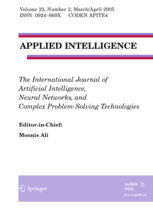
APPLIED INTELLIGENCE
Transforming ideas into impactful AI applications.Applied Intelligence is a prominent peer-reviewed journal that has been instrumental in advancing the field of Artificial Intelligence since its inception in 1991. Published by Springer, a reputable name in academic publishing, the journal focuses on the innovative applications of intelligent systems, algorithms, and methodologies across various disciplines. With an impressive Q2 ranking in the Artificial Intelligence category for 2023, and a Scopus rank of #117 out of 350 in its field, Applied Intelligence is recognized for its significant contributions and rigorous standards. The journal is accessed primarily through subscription, ensuring that high-quality research reaches the academic community and industry professionals alike. Its commitment to disseminating cutting-edge research makes it an invaluable resource for researchers, practitioners, and students interested in the practical implications of AI advancements. Join a community dedicated to exploring the transformative power of artificial intelligence and stay ahead in this ever-evolving field!
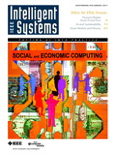
IEEE INTELLIGENT SYSTEMS
Exploring the Future of Artificial IntelligenceIEEE Intelligent Systems, published by the renowned IEEE Computer Society, stands at the forefront of research in the fields of Artificial Intelligence and Computer Networks and Communications. With an impressive Q1 ranking in both categories as of 2023 and Scopus rankings placing it in the top 5% of its field, this journal not only showcases cutting-edge scientific advancements but also serves as a vital resource for practitioners, academics, and students seeking to deepen their understanding and application of intelligent systems. The journal covers a broad range of topics including machine learning, data mining, and system architectures, reflecting its commitment to addressing contemporary challenges and innovations in technology. Although it does not offer open access, the journal's research contributions are invaluable, ensuring that its readership remains engaged with the latest findings and applications in a rapidly evolving field. For those interested in submitting high-quality research or staying updated on the latest developments, IEEE Intelligent Systems represents an essential hub of knowledge.

Computer Science Journal of Moldova
Transforming Ideas into Solutions for Tomorrow's ChallengesComputer Science Journal of Moldova, published by the Institute of Mathematics and Computer Science Academy, serves as a pivotal platform for disseminating research in the field of computer science since its inception in 1993. With a focus on a diverse range of subjects, including Artificial Intelligence, Computational Mathematics, and Software Engineering, this open access journal aims to foster innovation and collaboration among researchers, students, and industry professionals. Despite its current positioning in the lower quartiles as per the latest Scopus rankings, the journal remains committed to enhancing the visibility of regional research and addressing contemporary challenges through scholarly contributions. The journal’s open access model ensures that knowledge is freely available, promoting broader readership and impact within the international academic community. As it moves through the converged years from 2019 to 2024, the Computer Science Journal of Moldova continues to aspire toward empowering the next generation of computer scientists while enriching the global dialogue in this rapidly evolving field.
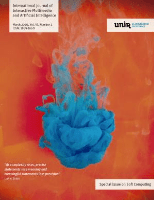
International Journal of Interactive Multimedia and Artificial Intelligence
Navigating the Frontiers of Artificial Intelligence and MultimediaThe International Journal of Interactive Multimedia and Artificial Intelligence, published by UNIV INT RIOJA-UNIR in Spain, is a leading Open Access journal that has been fostering knowledge dissemination in the field since 2008. With an ISSN of 1989-1660 and an impressive impact characterized by its Q1 and Q2 rankings across major categories in Artificial Intelligence and Computer Science, the journal serves as a crucial platform for researchers and professionals eager to explore innovative applications and technological advancements. This journal is particularly distinguished by its commitment to high-quality peer-reviewed research, evident in its current Scopus rankings, which place it among the top percentile in various computer science domains, including Statistics, Signal Processing, and Computer Vision. The journal's scope encompasses a wide array of topics that intersect with multimedia and artificial intelligence, making it an invaluable resource for students and emerging scholars aiming to deepen their understanding and contribute to these vibrant fields. Through its Open Access model, it ensures that research is accessible to a global audience, thus enhancing the visibility and impact of the scientific discourse.
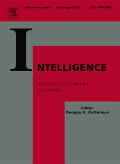
INTELLIGENCE
Illuminating Pathways to Understanding IntelligenceINTELLIGENCE, published by Elsevier Science Inc, is a leading international journal dedicated to advancing research in the fields of cognitive psychology, developmental psychology, and human intelligence. With an impact factor reflecting its authority within the academic community, this journal occupies a prestigious position—ranking in the Q1 category for Arts and Humanities and achieving strong Q2 rankings in both Developmental and Educational Psychology and Experimental and Cognitive Psychology. Scholars can access high-quality research articles that contribute to the understanding of intelligent behavior, cognitive processes, and the implications of intelligence in various contexts. By encompassing a broad range of interdisciplinary perspectives since its inception in 1977 and continuing into 2024, INTELLIGENCE serves as an essential resource for researchers, professionals, and students keen to explore the complexities of human thought and learning.

IEEE Open Journal of the Computer Society
Fostering Collaboration in a Digital EraIEEE Open Journal of the Computer Society is an esteemed open-access journal dedicated to advancing the field of computer science. Published by IEEE-INST ELECTRICAL ELECTRONICS ENGINEERS INC since 2020, this journal promotes innovative research and scholarly communication in a rapidly evolving technological landscape. With a notable Q1 ranking in the Computer Science (miscellaneous) category and a high Scopus percentile of 92, it serves as a premier platform for disseminating cutting-edge findings and interdisciplinary studies. The journal is committed to facilitating unrestricted access to valuable insights, fostering collaboration among researchers, professionals, and students alike. As it continues to publish impactful articles through 2024 and beyond, the IEEE Open Journal of the Computer Society remains a vital resource for anyone interested in the latest trends and developments in computer science.
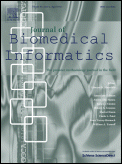
JOURNAL OF BIOMEDICAL INFORMATICS
Pioneering research at the crossroads of technology and medicine.JOURNAL OF BIOMEDICAL INFORMATICS, published by Academic Press Inc. Elsevier Science, is a premier peer-reviewed journal dedicated to the integration of computer science and health informatics to advance the field of biomedical engineering and healthcare. With its ISSN 1532-0464 and E-ISSN 1532-0480, this influential journal has established itself with an impressive impact factor, reflecting its high-quality research contributions. Recognized within the top quartile (Q1) of both Computer Science Applications and Health Informatics for 2023, the journal ranks #135 out of 817 in Computer Science Applications and #25 out of 138 in Health Informatics according to Scopus metrics. Offering open access options, it fosters extensive dissemination and accessibility of groundbreaking research findings to the scientific community. As a scholarly platform from 2001 to 2024, it is engineered to cater to the educational needs of researchers, professionals, and students, promoting innovative studies that bridge the gap between technology and healthcare.